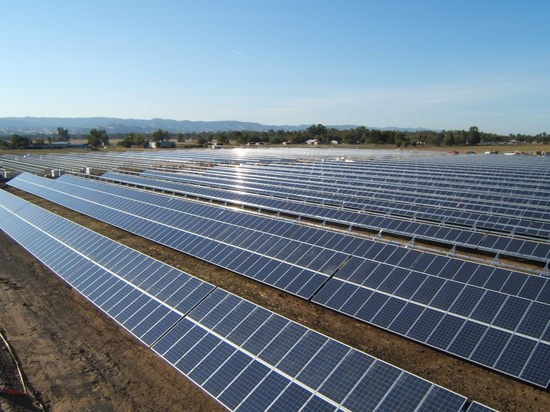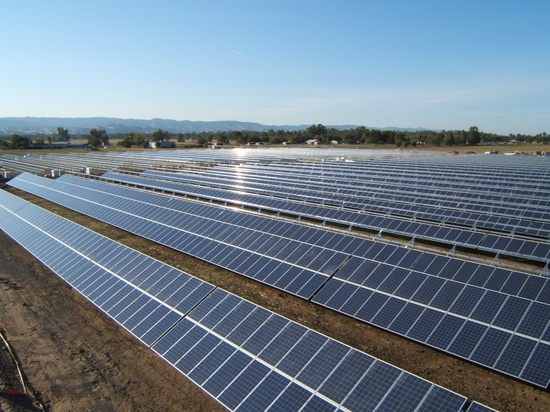 California will require utilities to generate one-third of their energy from renewable sources by 2020.Photo: PG&ECalifornia has stepped up again. It already has the toughest law in the country for fighting greenhouse gases — though it’s under heavy fire. And yesterday California raised the bar for states setting their own renewable electricity standards (RES).
California will require utilities to generate one-third of their energy from renewable sources by 2020.Photo: PG&ECalifornia has stepped up again. It already has the toughest law in the country for fighting greenhouse gases — though it’s under heavy fire. And yesterday California raised the bar for states setting their own renewable electricity standards (RES).
They got their standards: California’s Air Resources Board voted to require utilities in the state to generate 33 percent of their energy from renewable sources by 2020, which would be the most ambitious RES in the country. California already has a goal of getting 20 percent of its power from renewable sources by the end of this year, although it’s not going to hit that target. To meet the new standard, the state will need to invest in more infrastructure and transmission lines and speed up the approval process on big renewable projects, which now takes years. Reuters has more.
Meanwhile, in Washington, the cause for a national RES of 15 percent by 2021 picked up a little steam when another Republican, Sen. Charles Grassley (Iowa), jumped aboard as a co-sponsor. Two more Democrats, Sens. Debbie Stebenow (Mich.) and John Tester (Mont.) also have signed on. Sounds good, except RES supporters need another 35 votes for the bill to have a shot at making it out of the Senate after the November elections. To get more Republicans to join in might require stretching the definition of “renewable” to include nuclear and coal using carbon capture technology. But Sen. Jeff Bingaman (D-N.M.), the real force behind the RES revival, has already said that would cost him votes on the Democratic side and he doesn’t want to go there.
Fasten your seat belts.
And in other green news:
Then maybe he’ll want to take on that round Earth theory: Yet another reason to hope that Republicans don’t win back the House: Rep. Darrell Issa (R-Calif.) already is one of Congress’ leading irritants. If the Republicans take over, he likely will chair the House Oversight and Reform Committee and he’s saying that among the many investigations he’ll initiate is yet another one on Climategate. [Mother Jones]
Mary, Mary, quite contrary: And while we’re talking about congressional grandstanding, how about the latest stunt by Sen. Mary Landrieu (D-La.)? The other day she said she couldn’t consider supporting a renewable electricity standard until the moratorium on deepwater drilling in the Gulf is lifted. Now she says she’ll block the nomination of Obama’s choice of budget director until … that’s right, the moratorium on deepwater drilling is lifted. [The Hill]
Just fade away: Thanks to higher-than-average sea temperatures, this could be one of the worst years ever for coral bleaching in the Caribbean. [AFP]
Tell that to Darrell Issa: According to a survey of Scientific American and Nature website visitors, 40 percent of the respondents became more certain in the past year that humans are changing the climate. They also trusted scientists on evolution more than on any other subject. [Scientific American]
Oil-gotten gain: At a meeting of environment ministers in Oslo, a German official proposed a moratorium on drilling for oil in the northern Atlantic. But several countries that make a lot of money from offshore drilling, such as Norway, Great Britain, and Denmark, quickly put the kibosh on that idea. [AP]
Do the bite thing: Meanwhile, in the Gulf, BP finally agreed to meet with Louisiana officials to talk about their request that the oil company put up $75 million to test Gulf seafood and tell the world that it’s safe to eat. [New Orleans Times-Picayune]
Got juice? New analysis by Pike Research suggests that by 2015 there will be almost 5 million charging stations for electric cars around the world. About 1 million will be in the U.S., but almost two-thirds of those will be in people’s homes. [Pike Research]
Is everybody happy?: Meg Whitman, the Republican candidate for governor in California has come out against Proposition 23, which would suspend the state’s landmark greenhouse gas law. So she’s against suspending the law, right? Except that she also is proposing that enforcement of the law be suspended. That Meg, she aims to please. [Salon]
A not-so-mighty wind: A new generation of wind turbines will be able to generate power even when the wind isn’t blowing very hard. [BusinessGreen]
Psych!: The Chinese people have planted 56 billion trees in the past decade to help slow climate change. But scientists aren’t sure just how well it’s working. [The Guardian]



